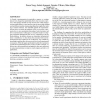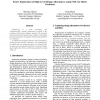145 search results - page 2 / 29 » Better, faster, and cheaper: what is better software |
KDD
2010
ACM
14 years 12 days ago
2010
ACM
At Google, experimentation is practically a mantra; we evaluate almost every change that potentially affects what our users experience. Such changes include not only obvious user-...
DATE
2006
IEEE
14 years 2 months ago
2006
IEEE
Partitioning is a time consuming and computationally complex optimization problem in the codesign of hardware software systems. The stringent time-to-market requirements have resu...
SEKE
1999
Springer
14 years 23 days ago
1999
Springer
Today’s software developments are faced with steadily increasing expectations: software has to be developed faster, better, and cheaper. At the same time, application complexity ...
CACM
2010
13 years 8 months ago
2010
As data volumes rise and retention periods increase, the appearance of "better, faster and cheaper" storage infrastructure seems like an all-encompassing solution to con...
FPGA
2008
ACM
13 years 10 months ago
2008
ACM
It has been shown that FPGAs could outperform high-end microprocessors on floating-point computations thanks to massive parallelism. However, most previous studies re-implement in...


